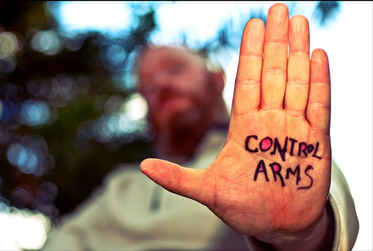First global arms treaty approved by the UN

Over 150 countries have voted in favor of a treaty that will prevent the sale of weapons to warlords, pirates and gangs
by Matt Burgess A total of 154 countries have voted in favor of the United Nations Arms Trade Treaty, which will regulate an international arms trade thought to be worth an estimated $70 billion. The treaty took six years to negotiate. The countries involved will be responsible for stopping the sale of weapons to those who may use them for human rights abuses, terrorism or organized crime, and they will have to refuse transfers of weapons if there is a risk they would be used to commit war crimes. Ammunition, battle tanks, warships, helicopters, light weapons, missiles and launchers will all be included in the treaty, which creates binding obligations for governments to assess all arms transfers. “This is a landmark agreement that will save lives and ease the immense human suffering caused by armed conflict around the world,” said British Prime Minister David Cameron. The treaty was passed by a majority on April 2, 2013, just a week after a meeting where it failed to get a unanimous vote. The Democratic People’s Republic of Korea, Iran and Syria all voted against the treaty at the General Assembly. A further 23 countries abstained. Oxfam said the signing of the treaty marked an “incredible moment.” Anna Macdonald, Oxfam’s head of arms control, said: “The agreement of the Arms Trade Treaty sends a clear message to arms dealers who supply warlords and dictators that their time is up. They will no longer be able to operate and arm themselves with impunity. The world will be watching and will hold them accountable.” However, the Campaign Against Arms Trade (CAAT) said the treaty could prove ineffective as countries may “exclude commercially sensitive or national security information.” Ann Feltham, CAAT’s parliamentary coordinator, said: “This treaty legitimizes the arms trade. If governments are serious about ending the trade in weaponry, with its dire consequences for peace and human rights, they should immediately stop promoting arms exports.” Countries are able to sign the treaty from June 3rd on, and it will take effect 90 days after the 50th country ratifies it. Supporters agree that it is just a first step and that it must be followed by a campaign for implementation. More Information: 
If you like this story, please consider taking out a donation-based subscription to support Positive News.
|
|


